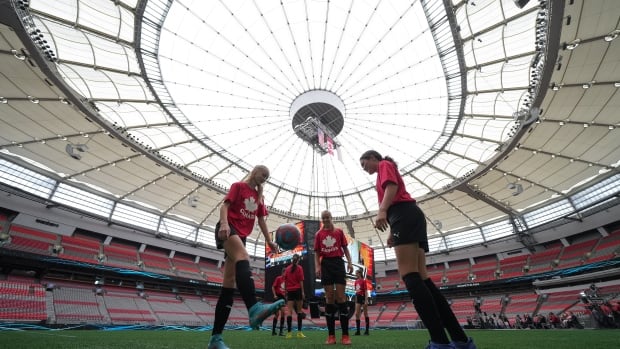[ad_1]
The City of Vancouver says it’s unable to give a complete estimate of costs associated with hosting matches at the 2026 FIFA World Cup because it is hosting two more games than it anticipated.
The original cost, released by the provincial government at the end of January 2023, pegged the bill for hosting five World Cup games at $230 million, with much of that money going toward event security.
But that estimate is out of date since FIFA — soccer’s international governing body — confirmed Vancouver will be hosting seven games, the city said.
“We will be assessing the impacts of delivering seven matches against current assumptions in order to update these estimates,” the city said in a statement.
“While we’re still in the early stages of analyzing the impact of hosting seven matches, we expect to see increased revenue opportunities from commercial partners and match day sales.”
Vancouver is set to host seven soccer games when the 2026 FIFA World Cup comes to town. Our Laurence Watt dives into whether Vancouver is ready to accommodate visitors flying in for the event.
The city said it is discussing the additional games with FIFA to determine anticipated costs and benefits, with no set date for the information to be released.
Whatever the new figure, a sports economy expert said cost estimates for any large-scale sporting event tend to be wrong.
“[In] the majority of studies that have looked at the cost of hosting mega events, whether you’re talking about Olympics, World Cup, et cetera, the costs themselves are generally underestimated,” said Brian Soebbing, a professor at the University of Alberta.
Soebbing also raised doubts about the economic benefits host cities tend to claim when hosting large-scale sporting events.
“Part of the idea of economic impact is you’ve got these visitors who are coming for the sole purpose of going to the World Cup. But Vancouver in and of itself is a very good tourist city in any year, right?
“There are going to be people who were going to go to Vancouver but are not going to go to Vancouver because of the World Cup.”
Part of the issue, Soebbing said, is fans coming for the World Cup will push out regular tourist groups or tours that would come to Vancouver and the region at the same time, meaning the economic benefit of sports fans is balanced out by the loss of other groups.
CBC’s Laurence Watt breaks down how you can get in on tickets for the seven FIFA World Cup games scheduled for B.C. Place Stadium.
The cost estimate for hosting does not include renovating B.C. Place, with PavCo — the Crown corporation that owns the stadium — putting out a request for proposal in December for a construction manager to oversee work needed.
PavCo’s request indicates B.C. Place, which turned 40 years old last year, will need more VIP suites and hospitality space on the stadium’s third level, an upgrade to food-court concessions, renovation of washrooms and installation of more elevators.
Toronto and Vancouver are the Canadian cities set to host matches during the 2026 World Cup, which will also be played across the United States and Mexico.
The cost of hosting additional games is an issue affecting Toronto as well.
The City of Toronto estimates it will cost $380 million to host World Cup matches in the city, an increase of $80 million compared to a 2022 forecast, partly because of the addition of another match to the schedule.
The cost increase also includes an evaluation of vendor quotes, safety and security requirements and inflationary uncertainty.
On The Coast7:30Assess the risks and rewards of hosting the FIFA World Cup or the Olympics
James Brander, a professor at UBC’s Sauder School of Business, assess the risks and rewards of hosting big sporting events, like the FIFA World Cup or the Olympics, in Vancouver
[ad_2]
Source link






